Saint Polycarp
Polycarp was Bishop of Smyrna at a time when Roman persecution of Christians was in full effect. Despite the constant rear of arrest, torture, and death, Polycarp remained resolute in his faith, candidly preaching his belief in Christ, and telling those of other faiths who demanded recognition and respect, “Yes I recognize you- I recognize you as the son of Satan.”
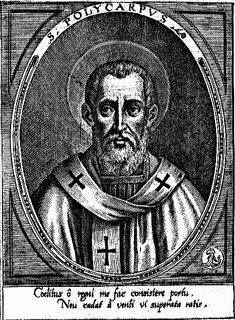 Polycarp was well-known in the early community as learned, patient, and wise. He demonstrated forgiveness, humility, and diplomacy in settling conflict and controversy in the Church. He wrote prolifically, although few of his work survives. Only one letter, a letter to the Philippians, has been preserved. In this letter, Polycarp summarizes and transmits the teachings of Christ:
Polycarp was well-known in the early community as learned, patient, and wise. He demonstrated forgiveness, humility, and diplomacy in settling conflict and controversy in the Church. He wrote prolifically, although few of his work survives. Only one letter, a letter to the Philippians, has been preserved. In this letter, Polycarp summarizes and transmits the teachings of Christ:Saint Polycarp modeled his life after Christ. He did not seek out martyrdom as did some at the time, instead, like Jesus, waiting until the Lord decided it was his time. When the Romans, bloodthirsty for the death of Christians, called for his death at the hands of wild animals in the arena, Polycarp was persuaded by friends to hide in a small farmhouse outside of the populated area. While there, Polycarp had a dream in which his pillow caught fire, leading him to tell his followers that he would be martyred by fire. There he was eventually found, after the Romans tortured the servant boys providing him food. Hearing the soldiers approaching, Polycarp came out of hiding to greet them, saying “God’s will be done.” He offered them a meal, and asked permission to pray for one hour before being arrested. Given that he was 86 at the time, calm and gentle, and had showed them hospitality, the soldiers allowed him two hours of prayer, during which he prayed for the continuation of the Church, and “every person he had ever known.” Saint Polycarp was then led to the arena for martyrdom.
Prior to release of the wild animals, expected to tear him to bits, the magistrate asked him to renounce Christ, unwilling to send an 86 year old man to his death. Polycarp answered, “Eighty six years have I been His servant, and He hath done me no wrong. How then can I blaspheme my King who saved me?” Again, the magistrate asked for Polycarp to renounce his faith and pledge an oath of allegiance to Caesar. Polycarp responded, "If you imagine that I will swear by Caesar, you do not know who I am. Let me tell you plainly, I am a Christian." Running out of options, the magistrate begged Polycarp to change his mind, or else be thrown to the wild animals. Unafraid, Polycarp responded, "Change of mind from better to worse is not a change allowed to us."
Polycarp, due to his lack of apparent fear, was sentenced to being burned alive. As they were tying him to the stake and lighting the fire, Polycarp prayed to Heaven:
"Lord God Almighty, Father of your beloved and blessed Son Jesus Christ, through whom we have received knowledge of you, God of angels and powers, of the whole creation and of the whole race of the righteous who live in your sight, I bless you, for having made me worthy of this day and hour, I bless you, because I may have a part, along with the martyrs, in the chalice of your Christ, to resurrection in eternal life, resurrection both of soul and body in the incorruptibility of the Holy Spirit. May I be received today, as a rich and acceptable sacrifice, among those who are in you presence, as you have prepared and foretold and fulfilled, God who is faithful and true. For this and for all benefits I praise you, I bless you, I glorify you, through the eternal and heavenly High Priest, Jesus Christ, your beloved Son, through whom be to you with him and the Holy Spirit glory, now and for all the ages to come. Amen."
The flames were lit, but miraculously did not touch the saint. Rather then spread around him like an arch, causing him to glow with a heavenly light. Seeing what was happening, the Roman soldiers stabbed him in the throat, killing him, his blood quenching the flames of the fire. His body was subsequently burned by the Romans to prevent him from being worshipped, although his bones were stolen by Christians and saved as relics.
Saint Polycarp is an inspiration to us. He remained true in his faith, candid in his words, and did not go looking for a glorious martyr’s death. But when it came looking for him, he readily accepted the will of the Lord, proclaiming the Good News until the moment he expired. His courage and confidence in the face of persecution inspires us to step outside of our own perceived strength and power, and to look to Him who provides all for us—our Father in heaven. For he will provide us all that we need: hope, endurance, love, strength, and righteousness. All we need to do is repent, believe, and ask.
Therefore we should persevere unceasingly in our hope and down payment of our righteousness, which is Christ Jesus, who bore our sins in his own body on the tree, who committed no sin, and no deceit was found in his mouth, but because of us, in order that we might live in him, endured all things. Therefore let us be imitators of his endurance, and if we should suffer because of his name, we should glorify him. For this is the example he set for us in himself, and this we have believed. (Polycarp to the Philippians, 8)
As written by the Church of Smyrna, detailing the events of Saint Polycarp's heroic martyrdom:
When the pyre was ready, Polycarp took off all his clothes and loosened his under-garment. He made an effort also to remove his shoes, though he had been unaccustomed to this, for the faithful always vied with each other in their haste to touch his body. Even before his martyrdom he had received every mark of honor in tribute to his holiness of life.
There and then he was surrounded by the material for the pyre. When they tried to fasten him also with nails, he said: “Leave me as I am. The one who gives me strength to endure the fire will also give me strength to stay quite still on the pyre, even without the precaution of your nails”. So they did not fix him to the pyre with nails but only fastened him instead. Bound as he was, with hands behind his back, he stood like a mighty ram, chosen out for sacrifice from a great flock, a worthy victim made ready to be offered to God.
Looking up to heaven, he said: “Lord, almighty God, Father of your beloved and blessed Son Jesus Christ, through whom we have come to the knowledge of yourself, God of angels, of powers, of all creation, of all the race of saints who live in your sight, I bless you for judging me worthy of this day, this hour, so that in the company of the martyrs I may share the cup of Christ, your anointed one, and so rise again to eternal life in soul and body, immortal through the power of the Holy Spirit. May I be received among the martyrs in your presence today as a rich and pleasing sacrifice. God of truth, stranger to falsehood, you have prepared this and revealed it to me and now you have fulfilled your promise.
“I praise you for all things, I bless you, I glorify you through the eternal priest of heaven, Jesus Christ, your beloved Son. Through him be glory to you, together with him and the Holy Spirit, now and for ever. Amen”.
When he had said “Amen” and finished the prayer, the officials at the pyre lit it. But, when a great flame burst out, those of us privileged to see it witnessed a strange and wonderful thing. Indeed, we have been spared in order to tell the story to others. Like a ship’s sail swelling in the wind, the flame became as it were a dome encircling the martyr’s body. Surrounded by the fire, his body was like bread that is baked, or gold and silver white-hot in a furnace, not like flesh that has been burnt. So sweet a fragrance came to us that it was like that of burning incense or some other costly and sweet-smelling gum.
O God, the maker of heaven and earth, who gave to your venerable servant, the holy and gentle Polycarp, boldness to confess Jesus Christ as King and Saviour, and steadfastness to die for his faith: Give us grace, following his example, to share the cup of Christ and rise to eternal life; through Jesus Christ our Lord, who lives and reigns with you and the Holy Spirit, one God, now and for ever.
Year 2: Day 54of 365
Prayer Intentions: Courage and endurance
Requested Intentions: Healing, successful relationship (S); For successful marriage (A); For a husband’s freedom from addiction (C); Freedom from pain and illness for a friend (M); Financial freedom (J); Successful passing of occupational examination (S); Healing and conversion, sale of house (L); Occupational success for employee and colleagues (J); Employment for a son (C); Successful attainment of an important appointed position (J); Recovery from cancer for a friend (Z); For a family’s freedom from sin (M); For a daughter with Diabetes (A); Reconciliation of a marriage (D); Assistance with a legal matter, financial freedom (R); Healing for a friend (M); For a son in medical school (H); Financial assistance (M); Successful employment (N): Freedom from mental illness for a friend (L); For successful marriage (N); For friends having and recovering from surgery; for the reduction of a brain tumor (L); For resolution of a housing crisis (P); For a brother who is struggling financially, for a son who is struggling academically (B); For financial security for a friend (C); Success in business; familial happiness and health (J); Health and recovery of a sister (I); Healing of a father following stroke (S).
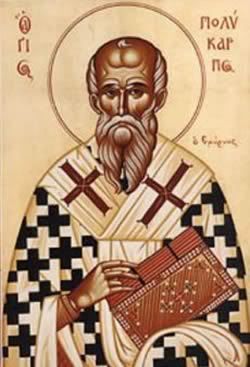
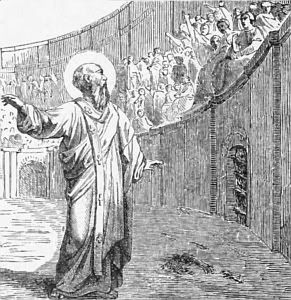
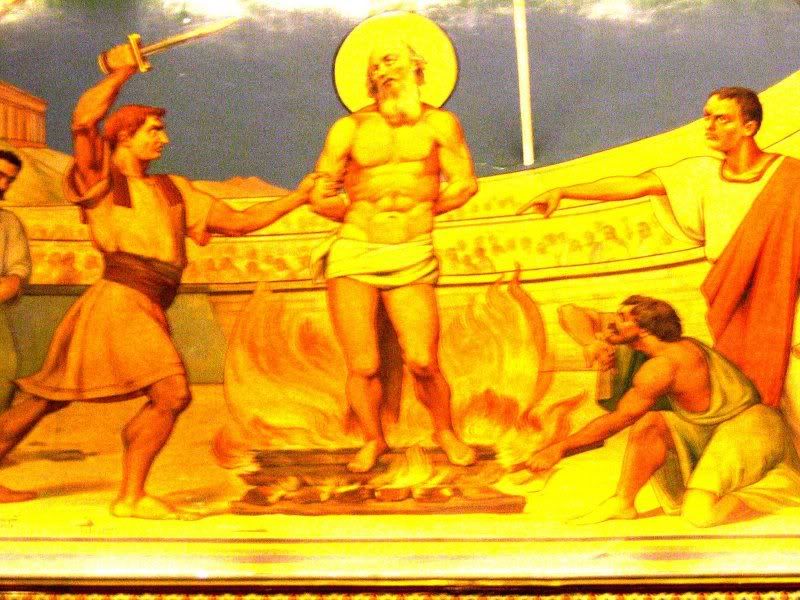
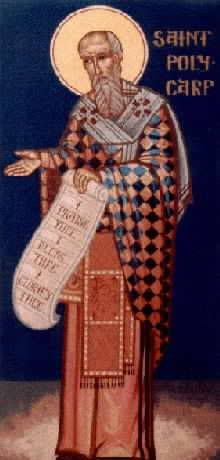
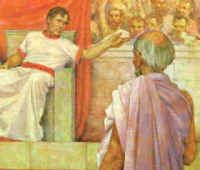
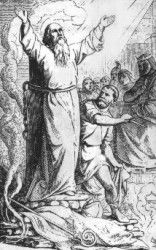
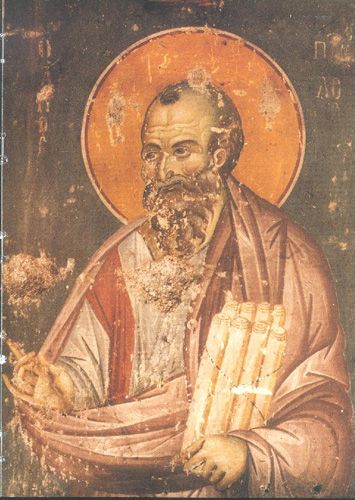
No comments:
Post a Comment
Thanks for leaving a comment. If you wish to submit a prayer request, however, please do so above, using the "Contact" tab.